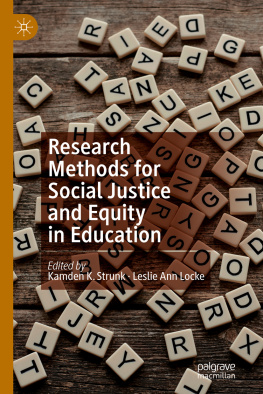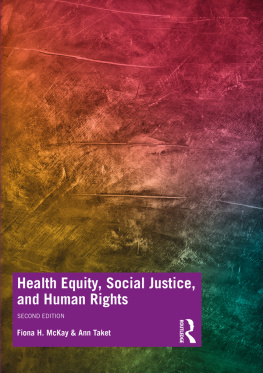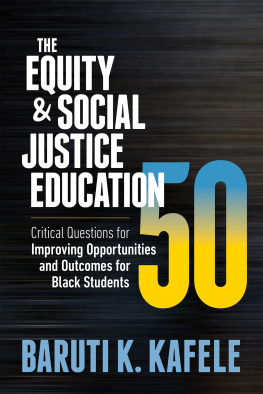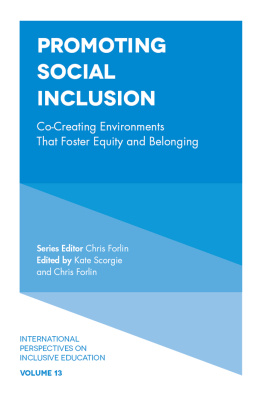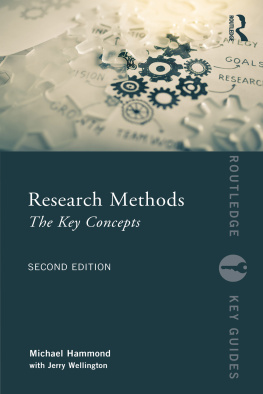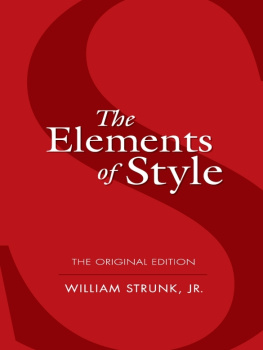Kamden K. Strunk - Research Methods for Social Justice and Equity in Education
Here you can read online Kamden K. Strunk - Research Methods for Social Justice and Equity in Education full text of the book (entire story) in english for free. Download pdf and epub, get meaning, cover and reviews about this ebook. City: Cham, year: 2019, publisher: Springer International Publishing, genre: Politics. Description of the work, (preface) as well as reviews are available. Best literature library LitArk.com created for fans of good reading and offers a wide selection of genres:
Romance novel
Science fiction
Adventure
Detective
Science
History
Home and family
Prose
Art
Politics
Computer
Non-fiction
Religion
Business
Children
Humor
Choose a favorite category and find really read worthwhile books. Enjoy immersion in the world of imagination, feel the emotions of the characters or learn something new for yourself, make an fascinating discovery.
- Book:Research Methods for Social Justice and Equity in Education
- Author:
- Publisher:Springer International Publishing
- Genre:
- Year:2019
- City:Cham
- Rating:3 / 5
- Favourites:Add to favourites
- Your mark:
- 60
- 1
- 2
- 3
- 4
- 5
Research Methods for Social Justice and Equity in Education: summary, description and annotation
We offer to read an annotation, description, summary or preface (depends on what the author of the book "Research Methods for Social Justice and Equity in Education" wrote himself). If you haven't found the necessary information about the book — write in the comments, we will try to find it.
Research Methods for Social Justice and Equity in Education — read online for free the complete book (whole text) full work
Below is the text of the book, divided by pages. System saving the place of the last page read, allows you to conveniently read the book "Research Methods for Social Justice and Equity in Education" online for free, without having to search again every time where you left off. Put a bookmark, and you can go to the page where you finished reading at any time.
Font size:
Interval:
Bookmark:
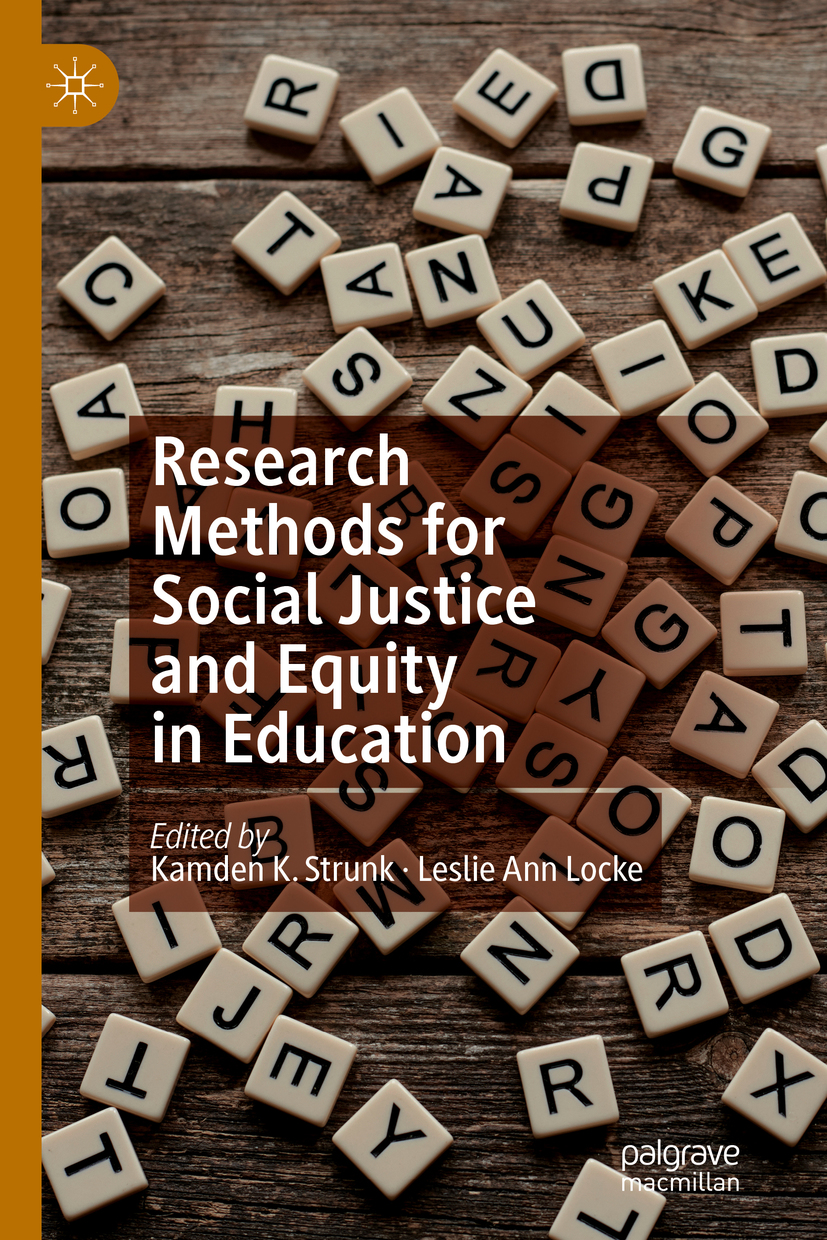

Cover illustration: Paul Viant / Photographers Choice RF / gettyimages
This Palgrave Macmillan imprint is published by the registered company Springer Nature Switzerland AG
The registered company address is: Gewerbestrasse 11, 6330 Cham, Switzerland
Typical instruction in research methods in education can be detached from real issues and real problems in education; it often focuses on the nuts and bolts of research processes, and sometimes with examples that are less than substantive. Similarly, students often progress through their research methods coursework with no real sense of how those methods can contribute to moves toward (or away from) equity. Our goal with this book is to provide theoretical, methodological, and practical information on how to mobilize educational research and research methods for social justice and equity in education.
Our experiences teaching similar content have guided our decisions about the structure of the text. We have observed that students often come to these classes with very static and uncritical ideas about research methodologies. They often think of those methodologies as set, natural, and unquestionable. So, we open the text with chapters that challenge those assumptions, and push students to think critically about the nature of the methodologies they are already familiar with and how those could be adapted for the purposes of social justice and equity. Further, we firmly believe that research must always be theoretical, and that without theory, research becomes reductive and meaningless. Because of that, the text next highlights several central and commonly used theoretical frameworks in research for social justice an equity. In introductory methods courses, students usually next arrive at questions around the practicalities of getting approval for this kind of research, collecting data for social justice and equity ends, and how they can analyze those data. So, the second section of the textbook includes chapters addressing these very practical, procedural questions about the conduct of social-justice-oriented and equity-oriented research. Finally, as students usually then want to understand how to apply those theoretical perspectives and research procedures to various areas of content, the culminating section of the book includes narratives from scholars articulating their research agenda and how they have worked with various methodologies in service of that research agenda. They also describe how they found a place and made careers as scholar-activists. The three sections of the textbook are titled, Philosophical and Theoretical Issues: Liberating Frameworks and Methodologies; Collecting and Analyzing Data for Social Justice and Equity; and Approaches to Social Justice and Equity in Educational Research.
We hope this textbook helps to guide students and researchers through the most typical sequence of questions they generate while exploring research for social justice and equity. In addition, the rationale for and structure of this book is guided in part by focus group interviews with current and former students. We have both taught these courses and debriefed with students the kinds of materials they would have found most helpful in the course. Thus, our goal was to create a textbook structure that meets most of those needs.
There are also a number of instructional supplements included in the text. One such supplement is that most authors have suggested further readings related to their chapters. A book like this is, necessarily, more of a survey text, and will not fully explore the depths of any theory or methodology. But we suggest that students who find they resonate with a particular approach that is introduced in this text take the next step of exploring the suggestions for further reading. These authors have thoughtfully selected readings that would help someone learn more and go deeper with their content. In addition to those suggestions for further reading, we have also collaborated with the chapter authors to produce a terminology section, found at the end of this text. That terminology section defines many terms and we hope provides some clarity on commonly misunderstood terms. Finally, we provide an index at the end of the text. We hope that is helpful in cross-referencing the ways that different approaches take up the same kinds of issues and problems. We appreciate the time and thought that the authors included in this textbook have taken to explain their approaches to research for social justice and equity in education. Below we provide a brief synopsis of each chapter.
Meagan Call-Cummings and Karen Ross explore how researchers might engage in reflexivity. The authors engage in reconstructive horizon analysis (RHA), which is an approach for examining taken-for-granted claims made by ourselves and our research participants. They find that by engaging in RHA, we build moments for dialogue and communication into the research process that allow assumptions, structures, and roles to be made explicit.
Laura Parson outlines the ethical concerns and potential methodological obstacles that can occur when conducting research with underrepresented, marginalized, or minoritized groups. Prioritizing the implications of conducting this research as a member of a dominant group and/or with privileged outsider status, she describes key methodological strategies to use when conducting social-justice-oriented research to address or mitigate ethical concerns and methodological obstacles.
Font size:
Interval:
Bookmark:
Similar books «Research Methods for Social Justice and Equity in Education»
Look at similar books to Research Methods for Social Justice and Equity in Education. We have selected literature similar in name and meaning in the hope of providing readers with more options to find new, interesting, not yet read works.
Discussion, reviews of the book Research Methods for Social Justice and Equity in Education and just readers' own opinions. Leave your comments, write what you think about the work, its meaning or the main characters. Specify what exactly you liked and what you didn't like, and why you think so.

